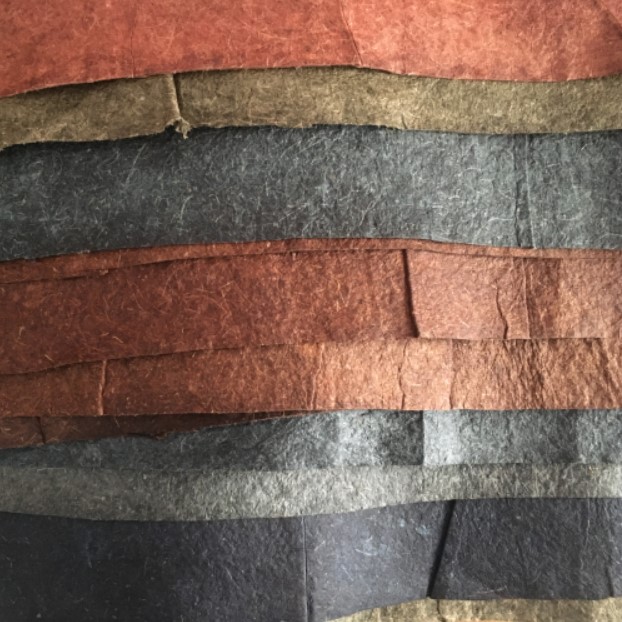Using Coconut Water, MALAI Is Making Vegan Alternative To Leather
Leather is the fifth largest exported Indian commodity with a value of 6.5 billion US dollars a year. It’s hard to miss the abundant leather production in Kanpur. The industry consists of big companies, but also of small businesses run at the courtyards behind houses on the roadside. One thing they have in common is their rancid smell expanding into surrounding communities and their significant contribution to water pollution. Leather is animal hide that is cleaned of hair, treated (or ‘tanned’) to preserve it and then finished with a specific colour, embossing or feel.
Demand for leather goods is growing but so is criticism of its severe environmental impact. Leather has a controversial history, and it’s a questionable material when it comes to sustainability. There are several factors to consider when evaluating both vegan and animal leather options:
- animal welfare
- waste
- greenhouse gas emissions
- water usage
This has us wondering, should we do away with leather altogether or find a compromise somewhere in the middle? The answer is Malai.
Malai reconciles a pure, simple philosophical approach to manufacturing with a sophisticated understanding of environmental science and technological processes resulting in a product that is unique.Malai started as a research project of two people: Susmith (a product designer and maker from Kerala ) and Zuzana (a material researcher and designer from Slovakia).The startup of converting coconut water into vegan leather has proved out to be a great alternative for leather so far.
Coconuts are an inseparable part of culture in most South Asian countries including India. India is one of world’s largest coconut cultivators . Mature coconuts are harvested for their shells as well as the white flesh which then gets pressed into valuable coconut oil. Very few coconut processing units however process the water ( this is not the tender coconut water). It is released into the drainage, from there it continues into the environment where it acidifies the soil.
However this is not the only fate that can await the mature coconut water. Water from mature coconuts contain nutrients used by Acetobacter Xylinum (a bacterium that feeds on it and ferments nano cellulose fibrils with astounding material properties).
Upto 4000 litres of water is disposed of every day by individual coconut processing units. This excess water is then collected, placed into vats and sterilised, resulting in an energy-rich, entirely natural nutrients upon which bacterial culture can feed. The fermentation period takes between twelve to fourteen days. A collection of 4000 litres of water per day, can be used to grow 100kg of cellulose.
The cellulose sheet then undergoes a process of refinement. It is enriched with natural fibers, gums and resins to create a more durable and flexible material. Malai is made in the form of sheets, each sheet is 120x80cm large. Their processing unit on the outskirts of Kochi has a monthly capacity to produce 200 square meters of the material in the form of a sheet or 3D shapes.
Malai is a flexible, durable material comparable to leather or paper. It is water resistant and because it contains absolutely no artificial chemicals it will not cause any allergies, intolerances or illness. Malai is available in a range of colours achieved through the use of mordant-free natural dyes. A patented cold batch dyeing method is used for this process. Plant extracts like Indigo, Madder, Cutch or Marigold petals are used in order to achieve warm earthy colours. During the production process the final weight, thickness and strength of the material can be controlled.
Malai sheets come in 3 weights : 500 gsm, 650 gsm and 800 gsm. The higher the gsm the stronger and thicker the material is. No textile backing is used on the sheets. The material has no front and reverse side, both sides have the same appearance. Malai is a very user-friendly material. Because of its entirely natural composition it is sensitive to humidity, much like paper or leather.
To ensure it remains at its best application of a thin layer of beeswax or coconut oil to the surface ensures it remains moisturised. Malai can last 4-8 years if properly cared for. When you wish to discard it, it can simply be placed in with your compostable rubbish and it will naturally break down.
The durability, wear and tear resistance of the product was tested at the German company, TUV based in Chennai which specializes in product testing. This certification validates that the product is tested for safety and meets the requirements of the German Equipment and Product Safety Act .
The leather industry is considered to be one of the most polluting industries in the world. There’s plenty to explore when it comes to the world of leather alternatives, and it’s an exciting time to see how this industry progresses. Material Innovation Initiative reporting has found that around 50 companies are currently working on next-gen leather-free materials. Almost all major brands are keen to use them, and there is plenty of financial support backing their development.
Malai currently supplies the material to brands such as UK-based Ethical Living and Lucky Nelly in Germany. Recently, the PETA-approved company clinched the winning title at Circular Design Challenge at Lakmé Fashion Week summer/resort 2020. The duo planned to make Malai more accessible in the Indian market by joining hands with a research team from IIT-Hyderabad. The future of a leather-free world is looking good for people, the planet, and of course, our animal friends.
MATERIAL DEPOTS QUICK 5
- BRAND : MALAI
- CATAGORY: FABRICS
- APPLICATION: HOME DECOR
- USP: VEGAN LEATHER
- NOTABLE PROJECTS: LAKME FASHION WEEK 2020, ETHICAL LIVING, RITI STORE, PLAYBAG.
